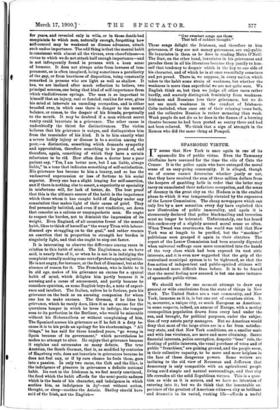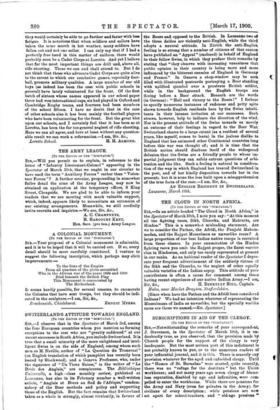SPASMODIC VIRTUE.
IT seems that New York is once again in one of its spasmodic fits of public virtue. Even the Tammany chieftains have assumed for the time the role of Cato the Censor. It is the police again who have outraged the moral sense of an easy-going community. It is alleged, though we of course cannot determine whether justly or not, that they have received the sum of three million dollars from the keepers of gambling hells in order that the latter may carry on unmolested their nefarious occupation, and the sense of decency in the great city on the Hudson is in the exalted phase to which it was temporarily elevated by the exposures of the Lexow Commission. The cheap newspapers which can only live by a new sensation every day have exploited this new illustration of public immorality, and again it is strenuously declared that police blackmailing and terrorism must no longer be tolerated. Unfortunately, one has heard this cuckoo-cry of a slightly aroused moral sense so often. When Tweed was overthrown the world was told that New York was at length to be purified, but the " machine " politicians soon grasped it again in their clutches. The report of the Lexow Commission had been scarcely digested when universal suffrage once more committed into the hands of the very class which had been exposed its vast civic interests, and it is even now suggested that the grip of the centralised municipal system is to be tightened, so that the free action of independent and public-spirited citizens will be rendered more difficult than before. It is to be feared that the moral feeling now aroused is but one more instance of spasmodic public virtue.
We should not for one moment attempt to draw any general or wide conclusions from the state of things in New York. The United States are a vast community, and New York, immense as it is, is but one out of countless cities. It is, moreover, a unique city, as much European as American, in some respects, indeed, an annexe of Europe, with a motley cosmopolitan population drawn from every land under the sun, and brought, for political purposes, under the subjec- tion of very astute party managers. But no American would deny that most of the large cities are in a far from satisfac- tory state, and that New York conditions, on a smaller scale and with less virulence, are more and more obtaining. Secret financial interests, police corruption, despotic "boss" rule, the flouting of public interests, the venal purchase of votes and of public "franchises," are gaining ground, and the people seem, in their collective capacity, to be more and more helpless in the face of these dangerous powers. Some writers are inclining to the old view of Rousseau and Jefferson that democracy is only compatible with an agricultural people living amid simple and natural surroundings, and that city life corrodes all the solid Republican virtues. This is a ques- tion as wide as it is serious, and we have no intention of entering into it; but we do think that the lamentable ex- perience of the greatest of American cities—a city so brilliant and dramatic in its varied, rushing life—affords a useful they would certainly be able to go farther and faster with less fatigue. It is notorious that when soldiers and sailors have taken the same march in hot weather, many soldiers have fallen out and not one sailor, I can only say that if I had a perfectly free hand in this matter of uniform there would probably soon be a Cadet Corps at Loretto. And yet I believe that far the most important things are drill and, above all, rifle shooting. These we can and shall attend to. But I do not think that those who advocate Cadet Corps are quite alive to the extent to which our combative games, especially foot- ball, promote military qualities. A large number of our old boys (as indeed has been the case with public schools in general) have lately volunteered for the front. Of the first batch of sixteen whose names appeared in our school paper three had won international caps, six had played in Oxford and Cambridge Rugby teams, and fourteen had been members of the school fifteen. I have no doubt that in the case of other schools also it has been mainly the football players who have been volunteering for the front. But the great blot upon our schools, and I certainly feel that it has been so at Loretto, has been the far too general neglect of rifle shooting. Here we can all agree, and here at least without any question- able result we can work a reformation.—I am, Sir, &c.,

































 Previous page
Previous page